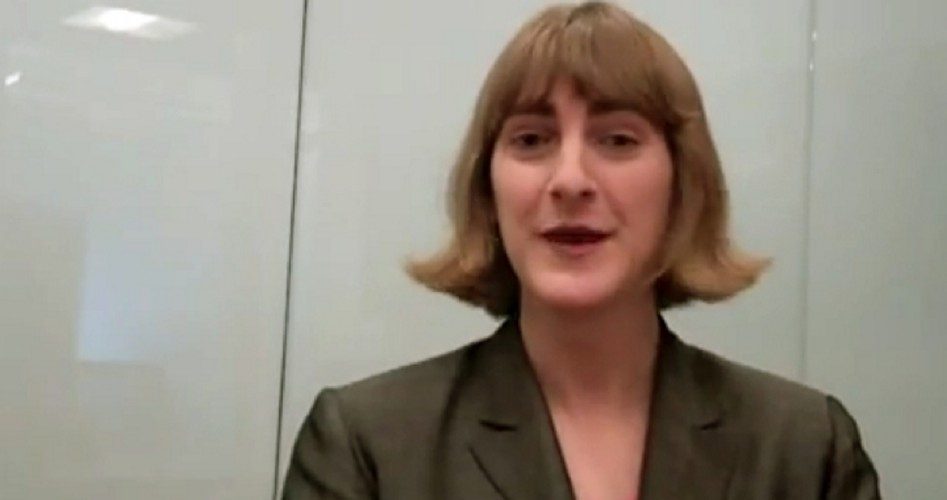
Individuals suffering from gender identity issues will no longer be required to undergo psychological evaluation in order to qualify for a pilot’s license, the Federal Aviation Administration (FAA) has decided. The change, reported the U.K.’s MailOnline news site, came after a “transgender” individual identifying himself as Tamsyn Waterhouse (pictured, from YouTube video) campaigned to have the long-time safety policy dropped. Waterhouse, who lives in San Francisco, “learned to fly as a child under her [sic] father’s supervision and gained her private pilot’s license in 2003 at the age of 23,” reported the news site. “But when the 32-year-old attempted to get her medical certificate renewed after finishing grad school in 2009, the Federal Aviation Administration made it near-impossible for her.”
In a YouTube video posted by the Transgender Law Center, which assisted in the case, Waterhouse explained that at the time he applied for the medical certificate renewal, he was also “in the process of gender transition” — meaning, apparently, that he was going through various surgical and hormonal procedures to assume a female identity. “The aviation medical examiner I saw had to defer my app to the FAA,” explained Waterhouse. “And the FAA responded by demanding a litany of psychiatric tests, which one psychologist I spoke to described as ‘every test in the book.’ ” Waterhouse explained that the tests “would have taken days and thousands of dollars” to complete, “and the FAA would still have the discretion as to whether to issue certification after that.”
The man-turned-woman complained that “even if I could have paid the money, passed the tests, and got a limited form of certification back, every transgender pilot in the U.S wold be subject to the same discrimination,” something he and the Transgender Law Center determined was unacceptable. With the help of, among others, homosexual Congressman Barney Frank (D-Mass.), the National Center for Transgender Equality, and the National Gay and Lesbian Task Force, Waterhouse and the Transgender Law Center succeeded in forcing the FAA to drop the policy. “Over the course of several years, and a lot of hard work,” Waterhouse said on the YouTube video, “now we’re proud to announce, finally, that the FAA has removed this unnecessary, burdensome, and prejudicial, psychiatric testing requirement.”
Waterhouse, who hopes to be in the air soon with a renewed medical certificate, said [s]he felt that the effort was “a big first step” toward ending discrimination against people who feel like changing their gender identity. “Someday I hope that all pilots can be treated fairly with regard to gender,” Waterhouse told ABC News.
Matt Wood, the Transgender Law Center attorney who helped Waterhouse with the case, argued that the FAA policy was tethered to “outdated stereotypes that someone who changed their gender had something mentally wrong with them. Anyone who is transgender has to undergo medical or psychological treatment to help their external body match their internal sense of self. That is no different from any other kind of medical condition.”
ABC News reported that the updated FAA policy “now states that no neurocognitive testing is required unless it is clinically indicated. ‘Basically, the doctor looks to see if [the pilot] is color blind and can pass all the medical things and if the therapist says the transition had gone well or was a success,’ Wood said. ‘It’s no longer carte blanche.’ ”
Commercial airlines have already crossed the transgender “discrimination” bridge. For example, “American Airlines helped veteran pilot Mark Feinmel when he became Melissa Feinmel,” reported ABC News. “When Feinmel had a sex change operation in 2000, American cleared many of the regulatory hurdles.” Feinmel told Bloomberg Businessweek that there was “a fear of losing my job, fear of losing my friends, fear of discrimination in the cockpit,” but American “helped [me] face all those issues,” allowing him to continue his job, which now consists of flying Boeing 777s on trans-Atlantic routes.
Of course, there are qualified individuals who continue to insist that transgenderism is nothing less than dysfunctional. U.K.’s Christian Institute, for example, highlighted the story of Charles Kane, a British man who underwent a sex-change procedure to take on a female persona, then changed back, insisting that such procedures should be halted. Kane, who spent some £100,000 on the surgery, said later, “I believe sex-change operations should not be allowed…. People who think they are a woman trapped in a male body are, in my opinion, completely deluded. I certainly was. I needed counseling, not a sex-change operation.”
The Christian Institute noted that “critics of sex change operations say that gender dysphoria is a psychiatric problem, not a physical one, and radical physical surgery does more harm than good.” The U.K. Christian website noted that a report released in 2000 by the British government’s Home Office, concluded: “Many people revert to their biological sex after living for some time in the opposite sex.”
On a religious and moral level, Father Anthony Mastroeni, who has taught at both Franciscan University and Christendom College, and who has written extensively on the moral implications of sex-change surgery, called such procedures “cooperating with psychosis.” He added that “sex reassignment procedures do nothing “but increase human misery. There’s no scientific evidence that anyone is born with gender dysphoria.”
According to Catholic Online, “The Vatican’s Congregation of the Doctrine of the Faith in 2000 issued a document that authoritatively concluded ‘sex-change’ operations are invalid — they do not change a person’s sex.”
And writing in 2004 in the magazine First Things, Dr. Paul McHugh, a psychiatry professor at Johns Hopkins University, wrote that he had “witnessed a great deal of damage from sex-reassignment.” McHugh said that with regard to individuals who think they were born with the wrong sex, “We psychiatrists, I thought, would do better to concentrate on trying to fix their minds and not their genitalia.”



